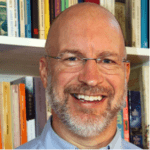Linguist in the Spotlight: An Interview with David Rumsey
 Following our most recent “Linguist in the Spotlight” interview (with current ATA President Corinne McKay), we could not be happier to have had the opportunity to speak to immediate past president of ATA, David Rumsey. A Swedish-, Danish-, and Norwegian-to-English translator for nearly 30 years, David has a wealth of knowledge about the profession (which, by the way, he fell into by accident!) that he graciously shares with us. Read on to hear his perspective on what it was like to translate pre-Google, why translators should invest in their education, what he has gained from his involvement in professional associations, and the value of venturing out from behind our computer screens. He also reveals some underutilized CAT and Outlook features for organization and productivity.
Following our most recent “Linguist in the Spotlight” interview (with current ATA President Corinne McKay), we could not be happier to have had the opportunity to speak to immediate past president of ATA, David Rumsey. A Swedish-, Danish-, and Norwegian-to-English translator for nearly 30 years, David has a wealth of knowledge about the profession (which, by the way, he fell into by accident!) that he graciously shares with us. Read on to hear his perspective on what it was like to translate pre-Google, why translators should invest in their education, what he has gained from his involvement in professional associations, and the value of venturing out from behind our computer screens. He also reveals some underutilized CAT and Outlook features for organization and productivity.
His “accidental” introduction to a nearly 30-year career
Like many translators my age, I actually got started by accident. I was a graduate student working in Scandinavian history, and a translation agency contacted the department looking for somebody who could translate a document on a Danish garbage-disposal system. I found the translation projects fun and challenging, and ultimately more financially profitable than pursuing my PhD. Since that point in 1990, I never looked back.
Vodka and heavy-metal music: Some of his most memorable projects over the years
In the mid-1990s, when single-malt whiskey became a fad in the US, I translated documents from a large alcohol company that had a strategic plan to create a line of premium vodkas, even though they knew that there was actually no difference in terms of the distillation process. Sure enough, a few years later, a whole host of “premium vodkas” arrived on the shelves. Another interesting project was the history of Swedish heavy-metal music. Not that I’m a fan, but it was a very interesting project!
A few of his favorite things about a career in translation
The flexibility cannot be beat. However, the fact that each project is unique and the profession provides ongoing learning opportunities. I love learning about new developments in the field of energy and technology.
A piece of advice for new translators: Never stop learning
Invest in your education and continue to learn about subjects that interest you so that you can write clearly about them as a translator. Being a translator or interpreter is a lifelong learning practice.
What it was like to translate before Google, and a lesson learned
I learned early on, within the first year of my career, not to accept projects that I did not feel comfortable translating. At the time, I felt pressure to accept any and all projects, even in fields that I was not conversant in. There was a lot of “guessing” in terms of the terminology in that case. But this was long before there was even Google. The results were, shall we say, less than satisfying for the customer. I was very grateful that the project manager provided the feedback and was understanding. A lesson learned: if you don’t feel like you have a good understanding of the document, don’t accept it.
Visibility: The value of networking and association databases
At this point, most people either find me through referrals or through various association databases. I still get lots of projects from the ATA database.
Getting out from behind the screen: The benefit of meeting colleagues in person
Being involved with the ATA has helped me to network with people who can provide support and augment my own skills. Even before I became part of the ATA Board of Directors, I attended the ATA Conference and Nordic Division activities regularly. I learn so much from other translators about how they run their business, how they approach translation challenges, and tips for terminology and technology resources. Meeting your colleagues in person is so much more valuable than online, behind the screen. I always come away from the ATA Conference so energized about my profession.
Unexpected lessons learned through membership and participation in professional associations
Obviously I have been involved with the American Translators Association the most. In addition to being a board member and president from 2015 to 2017, I was also involved in the certification program and the Nordic Division, and was a regular conference attendee. Besides the contacts and professional development opportunities in terms of translation, my volunteering at ATA also fostered new skills unrelated to translation that I still use. These can include leadership skills, conflict resolution skills, interpersonal communication skills, time management skills, and even website skills, etc.
I am also a member of the Swedish Association of Professional Translators (SFÖ). I enjoy attending their events because it helps keep me up to date in terms of my Swedish language skills.
Oft-overlooked tools: The power of term management, plus some Outlook hacks
In terms of CAT tools, I think that terminology software is severely underutilized. Although we might not benefit from a high level of repetition between projects from various clients, we might benefit enormously from a detailed terminology program that we can use with regular word-processing programs and not just translation programs. My MultiTerm database is quite large and I can keep it open separately when working on all kinds of projects. At the very minimum, it’s important for translators to start to collect and manage terminology.
In addition, I really enjoy working with Microsoft Outlook, which allows me to flag messages in different colors to indicate whether they are in the bidding stage, confirmed, or overdue. I can schedule them on a calendar with reminders. Outlook also allows you to create specific autoreplies and to move messages with specific keywords or from specific people and place them in specific folders or perform specific actions on them. Outlook is an incredibly powerful tool if you work with it as a mail client, and even as an online webmail program.
 David Rumsey is the immediate past president of the American Translators Association (2015-2017). Since entering the profession in 1990, David has worked on all sides of the language industry: on the agency side as a project manager at two US-based agencies, on the client side as a project manager in the localization department at a large software firm, and always as a freelance Scandinavian>English translator in the fields of energy, technology and medicine. He works from his home on Salt Spring Island, British Columbia, Canada. He can be reached through www.northcountrytranslation.com.
David Rumsey is the immediate past president of the American Translators Association (2015-2017). Since entering the profession in 1990, David has worked on all sides of the language industry: on the agency side as a project manager at two US-based agencies, on the client side as a project manager in the localization department at a large software firm, and always as a freelance Scandinavian>English translator in the fields of energy, technology and medicine. He works from his home on Salt Spring Island, British Columbia, Canada. He can be reached through www.northcountrytranslation.com.
